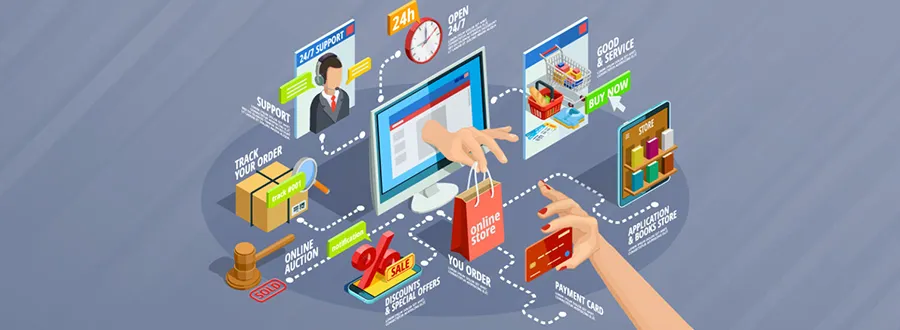Many business owners will consider the move to eCommerce, but it is a daunting topic. Choosing the right platform is a big part of this decision process.
Our tips for choosing the right eCommerce platform:
- Consider the size and complexity of your business: If you’re just starting out, a basic eCommerce platform like Wix may be enough; however, if you have more complex needs such as multiple product categories or extensive inventory management, something like Shopify might be better.
- Take into account your budget: While there are free eCommerce platforms available, they often come with limited features or payment processing fees. It’s important to consider your budget when choosing an eCommerce platform as some of them require monthly subscription fees.
- Pay attention to the payment processors available: Popular payment processors like Stripe and PayPal need to be integrated into your store in order for customers to make purchases. Make sure that these popular payment processors are supported by the eCommerce platform you choose.

- Consider your product categories: If you have multiple product categories or extensive inventory management, something like Shopify might be better than a simpler platform like Wix. On the other hand, if you only need to list a few items for sale and don’t require complex features, Wix may be sufficient.
- Think about scalability: You want to choose an eCommerce platform that is able to scale with your business as it grows. Look for a platform that can handle a large number of orders, has customer service features built in, and offers customisation options such as the ability to add third-party plugins or custom themes.
- Consider payment options: The eCommerce platform should be able to accept multiple types of payments so that you can get paid quickly and securely. Some platforms offer additional features such as digital wallets, recurring billing, and tax calculation tools which can help streamline the checkout process for customers.
- Evaluate security measures: Security is an important factor when selecting an eCommerce platform, so ensure you understand how your data will be protected and what encryption protocols are used. Additionally, ensure that the platform is PCI compliant to keep customers’ data safe and secure.
- Consider scalability: As your business grows, you may need to upgrade your eCommerce platform so look for one that can easily scale up or down depending on your needs. Look for features such as an API for custom integrations and a content delivery network (CDN) for faster loading times.
- Look for customer support: Ensure that the eCommerce platform provides excellent customer support in case you experience any technical issues or have questions about how to use it. Try to find reviews from customers who have already used it so that you can get an idea of their experiences before making a decision.

- Analyse customer support options: Make sure the eCommerce platform provides excellent customer service with resources such as FAQs, tutorials, user forums and live chat support. This will help ensure any issues are resolved quickly and efficiently.
By taking these factors into account when selecting an eCommerce platform, you can make sure you’re getting the most out of your investment and that your website is running smoothly. Be sure to do your research and read customer reviews so that you can be confident in making an informed decision.
When deciding which eCommerce platform to use for your business, it’s important to consider the features and benefits of each. Each platform has its own unique offerings that may be better suited for different types of businesses.
For example, Shopify is ideal for those looking for an easy-to-use platform with great support and customisation options. It offers a wide range of payment options and integrations, plus its built-in storefront makes setup quick and easy. The advantages of Shopify are:
- Simple, user-friendly setup
- Comprehensive customisation options
- Wide range of payment options and integrations
- Low transaction fees

WooCommerce is a popular choice among small business owners since it’s free to use and highly customisable. It integrates with WordPress plugins and themes, so you can easily make your store look the way you want. However, WooCommerce does require more technical knowledge to set up and manage than some other platforms. The advantages of WooCommerce are:
- No transaction fees
- High level of customisation
- Powerful WordPress integration capabilities
- Low cost to set up and maintain
Magento (Open Source) is an open-source, enterprise-level eCommerce platform designed for businesses that need a lot of features and flexibility. It’s more complex than other solutions, making it best suited for larger, more established businesses with technical resources. However, the range of features makes it an attractive option for companies looking to grow over time. However, for those who need a full-featured eCommerce solution, we recommend Adobe Commerce, which includes an optimised cloud architecture and hosting as well as AI-powered merchandising and analytics. The advantages of Magento are:
- Robust feature set, including powerful marketing tools
- Highly customisable design options for advanced users
- Seamless integrations with third-party systems and services
BigCommerce is a good choice for larger businesses that need advanced features like product filtering, multiple payment options, and customer segmentation. It also offers an extensive library of apps to help you customise your store even further. However, it can be more costly than other platforms due to its subscription fees and premium features. The advantages of BigCommerce are:
- Powerful built-in tools such as analytics and marketing automation
- Ability to create custom pages and menus
- Support for multiple languages and currencies
- Integration with third-party services like shipping providers and payment gateways

- Easy to use drag and drop visual editor
- Good choice of stylish themes
- Simple setup process
- Ability to integrate with popular payment processors like Stripe and PayPal
- Wide range of design templates
- Highly customisable designs with Elementor page builder
- Robust eCommerce tools, including online store analytics
- Ability to accept payments via multiple payment processors

Successful eCommerce brands have a few things in common. Not only do they have an attractive and well-designed website, but they also provide excellent customer service. Companies like Amazon, eBay and Etsy have become household names because of their stellar reputations for easy online shopping experiences. They make ordering quick and convenient with their user-friendly websites and streamlined checkout process. Furthermore, these companies prioritise customer satisfaction with return policies that are designed to provide the best possible service to customers. By focusing on providing value through convenience, reliability, and great customer experience, these eCommerce companies have achieved success at becoming leaders in the industry.
Another example of a successful eCommerce business is Zappos.com which has been recognised multiple times as one of the top eCommerce stores in the world. The company was founded on a customer-focused business model, providing excellent customer service and a wide range of shoe brands to fit any need. They also have an easy returns policy, free shipping both ways, and one of the most generous loyalty programs in the industry. Zappos has achieved great success by recognising that customers’ needs come first and delivering on their promises.


Warby Parker is one of the most successful eyeglass companies in the world, with a strong focus on providing consumers with fashionable glasses at an affordable price. Warby Parker has revolutionised the market by offering customers a virtual try-on experience, allowing them to see how different frames will look without having to visit a store. In addition, they offer free home trials and no-hassle returns which has helped them to become one of the most successful eCommerce brands in recent years.



Some successful Australian e-commerce sites include The Iconic, Myer, Catch and Kogan. The Iconic is a popular destination for fashion and lifestyle items, offering customers free delivery on orders over $50 as well as easy returns. Myer has been around for ages and offers customers a wide range of clothing, home goods and more at competitive prices. On the other hand, Catch is an online marketplace which provides its users with access to hundreds of products from different retailers with discounts of up to 70%. Lastly, Kogan is an online superstore that sells everything from TVs to laptops at unbeatable prices.
These eCommerce sites have all become extremely successful due to their ability to provide customers with great value for money when it comes to purchasing home goods. With constantly changing trends, it is important for eCommerce sites to stay ahead of the game and offer customers products at prices that cannot be found elsewhere. As such, these three brands have all managed to carve out a place in the eCommerce space with their unique offerings. They are examples of what can be achieved when retailers focus on providing excellent customer service, competitive pricing and convenient ways for customers to shop online. With eCommerce continuing to grow as an industry, we will likely see more success stories like these emerge in the future.
It is clear that understanding customer needs and staying ahead of trends are key components of successful eCommerce websites. As such, any retailer looking to make a mark in this field should take note of what Myer, Catch and Kogan have achieved. Each of these brands has built strong relationships with their customers, providing them with the convenience they highly value while also delivering an engaging shopping experience.
By taking cues from successful eCommerce businesses and combining them with a unique strategy that works for their own business model, retailers can use this to create a differentiated offering in line with customer demands. The future of eCommerce is bright and full of possibilities – embrace it and make sure you are ahead of the curve!
The Computing Australia web development team are platform agnostic – we prefer to gain an understanding of your products, services and goals, to then make a recommendation of a platform to match your business needs.
Most businesses launch only one eCommerce play, and in truth, many fail badly – work with an agency that has launched dozens of successful eCommerce sites to partner with you.
Contact Chris on 0438 855 884 or email sales@computingaustralia.group



